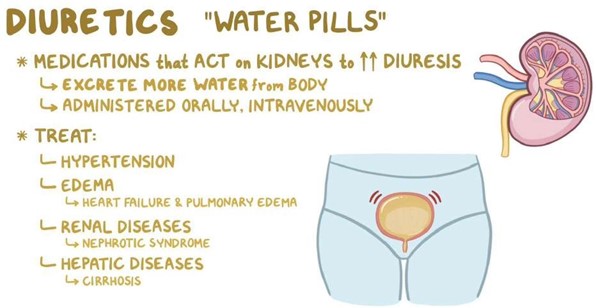A client is experiencing symptoms of fluid overload.
Which of the following interventions would the nurse anticipate as appropriate for this client?
Administering a diuretic medication.
Encouraging increased fluid intake.
Providing a high-sodium diet.
Elevating the affected extremities.
The Correct Answer is A

Fluid overload, also called hypervolemia, is a condition in which the body has too much water.
It can cause edema, hypertension, shortness of breath, and cardiovascular problems.
Diuretics are medications that help the body remove excess fluid through urine.
They are commonly used to treat fluid overload caused by heart failure, kidney failure, cirrhosis, and other conditions.
Choice B is wrong because encouraging increased fluid intake would worsen the fluid overload and increase the risk of complications.
Choice C is wrong because providing a high-sodium diet would also worsen the fluid overload and increase the risk of complications.
Sodium is an electrolyte that regulates fluid balance in the body.
Excess sodium intake can cause water retention and increase blood pressure.
Choice D is wrong because elevating the affected extremities is not an appropriate intervention for fluid overload.
Elevating the extremities can help reduce swelling caused by local factors such as injury or inflammation, but it does not address the underlying cause of fluid overload.
Nursing Test Bank
Naxlex Comprehensive Predictor Exams
Related Questions
Correct Answer is A
Explanation
Acute renal injury (ARI) is a term for a reversible syndrome that results in decreased glomerular filtration rate (GFR) and oliguria. GFR is a measure of how well the kidneys filter blood and oliguria is a condition of producing less than normal amounts of urine.
Choice B is wrong because chronic renal injury (CRI) is not a reversible syndrome, but a progressive loss of kidney function over months or years.
Choice C is wrong because end-stage renal disease (ESRD) is not a reversible syndrome, but a condition where the kidneys have lost most or all of their function and dialysis or transplantation is required.
Choice D is wrong because acute tubular necrosis (ATN) is not a term for a syndrome, but a specific type of acute kidney injury that involves damage to the tubules, the part of the nephron that reabsorbs water and solutes from the filtrate.
Correct Answer is B
Explanation
Serum creatinine is a waste product that comes from muscle activity and is normally removed by the kidneys.
When the kidneys are damaged, the serum creatinine level rises.
The glomerular filtration rate (GFR) is a measure of how well the kidneys are filtering the blood and it is calculated from the serum creatinine level.
A normal GFR is 60 or more, while a GFR below 60 may indicate kidney disease.
Therefore, monitoring the serum creatinine level and the GFR can help assess the renal function in CKD.
Choice A is wrong because blood glucose level is not a direct indicator of renal function, although high blood glucose can damage the kidneys over time.
Choice C is wrong because serum albumin level is not a specific marker of renal function, although low serum albumin can be caused by protein loss in the urine due to kidney damage.
Choice D is wrong because white blood cell count is not related to renal function, but rather to immune system activity and infection.
Normal ranges for serum creatinine are 0.6 to 1.2 mg/dL for men and 0.5 to 1.1 mg/dL for women.
Normal ranges for GFR are 90 to 120 mL/min.
Normal ranges for serum albumin are 3.4 to 5.4 g/dL1.
Normal ranges for white blood cell count are 4,000 to 11,000 cells per microliter.
Whether you are a student looking to ace your exams or a practicing nurse seeking to enhance your expertise , our nursing education contents will empower you with the confidence and competence to make a difference in the lives of patients and become a respected leader in the healthcare field.
Visit Naxlex, invest in your future and unlock endless possibilities with our unparalleled nursing education contents today
Report Wrong Answer on the Current Question
Do you disagree with the answer? If yes, what is your expected answer? Explain.
Kindly be descriptive with the issue you are facing.
